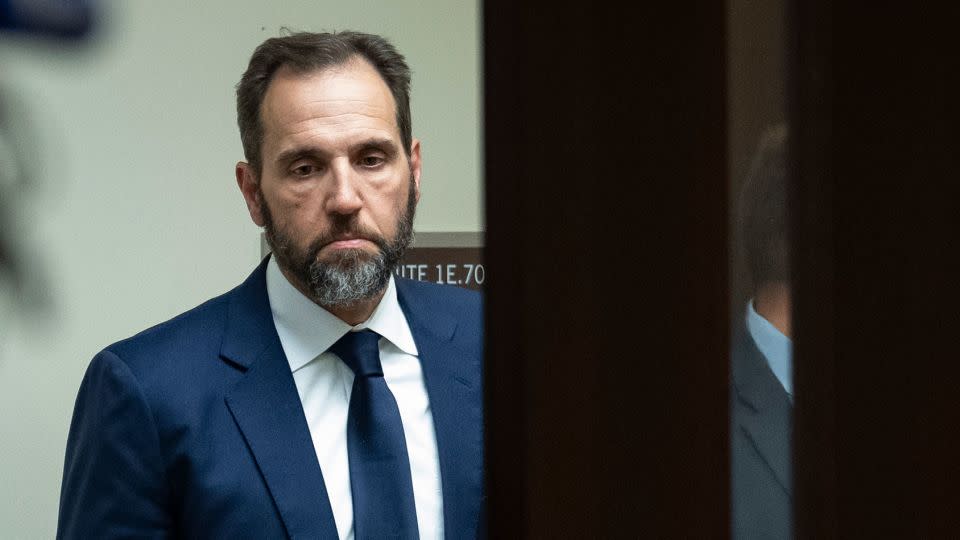Special counsel asks Judge Cannon to label Trump’s immunity claim in classified documents as ‘frivolous’

- Oops!Something went wrong.Please try again later.
- Oops!Something went wrong.Please try again later.
- Oops!Something went wrong.Please try again later.
- Oops!Something went wrong.Please try again later.
Special counsel Jack Smith is forcefully opposing former President Donald Trump’s sweeping claim of presidential immunity in the criminal case over his handling of classified documents, urging the judge to cut off Trump’s ability to appeal the issue in a way that would delay his trial.
The “immunity claim here is so wholly without merit that it is difficult to understand it except as part of a strategic effort for delay,” Smith’s office wrote in one of a host of legal filings Thursday afternoon.
Trump is charged with taking classified national defense documents from the White House after he left office and resisting the government’s attempts to retrieve the materials. He has pleaded not guilty.
The indictment against Trump in Florida, prosecutors said, “does not charge Trump for any acts that he undertook as President, let alone an official presidential act.”
Smith’s office asked Judge Aileen Cannon to certify Trump’s new immunity claim as “frivolous,” which would foreclose the former president’s avenue for an immediate appeal that would delay the trial. An immunity claim is one of the few issues that, if appealed, could derail a trial.
The timelines leading to trial have become a flashpoint in Smith’s two prosecutions.
Trump’s presidential immunity claim in his separate January 6, 2021-related federal case, which is largely about actions he took while president, wasn’t deemed to be frivolous by the courts, and his case has been on hold for weeks while the courts consider the issue. The Supreme Court has scheduled oral arguments for April 25.
In separate court filings Thursday, Smith responded to Trump’s other arguments for dismissing the classified documents case, including allegations of selective and vindictive prosecution as well as claims that the former president was allowed to take classified material to his Mar-a-Lago estate after he left the White House and that the special counsel was unlawfully appointed.
Cannon set a hearing for March 14, and told the parties to “reserve a full day for argument” on two motions from the defendants covering their argument that Trump was legally allowed to take classified material to his Mar-a-Lago residence.
Vindictive prosecution claims
Smith pushed back strongly on Trump’s claim that he’s the victim of selective and vindictive prosecution, and being treated differently than others who have allegedly mishandled classified material – including President Joe Biden and former Vice President Mike Pence.
“He has not identified anyone who has engaged in a remotely similar battery of criminal conduct and not been prosecuted as a result,” prosecutors wrote in their filing.
Smith leaned heavily on former special counsel Robert Hur’s report on Biden’s handling of classified documents, saying the Trump’s comparison between the two probes “fails.” Hur declined last month to bring charges against Biden in the matter.
“Trump, unlike Biden, is alleged to have engaged in extensive and repeated efforts to obstruct justice and thwart the return of documents bearing classification markings,” the special counsel wrote.
Smith said that the former president’s arguments do not satisfy the legal elements required to prevail on such a claim, which include showing that prosecutors acted with “genuine animus” toward a defendant.
Instead, prosecutors said, the conduct at issue in the case made it so that “Trump ‘in effect selected [himself] for prosecution.’”
‘Personal’ records argument
Trump has also repeatedly asserted both on the campaign trail and in court that his handling of classified material is allowed under the Presidential Records Act, but prosecutors say nothing in the federal law permitted Trump to take and store classified material.
“His claim that obviously presidential records — highly sensitive government documents bearing classification markings that were presented to Trump during his term in office — can be transformed into ‘personal’ records by the alchemy of removing them from the White House is false,” prosecutors wrote.
And while Trump’s attorneys have argued that as president, he could designate records as “personal” and lawfully keep them after leaving office, prosecutors said Thursday that, “Nothing in the PRA remotely suggests that the President can lawfully convert presidential records into personal ones simply by removing them from the White House at the end of his term.”
The PRA says the moment a president leaves office, the National Archives and Records Administration gets custody and control of all presidential records from their administration. Personal records are described in the PRA as things like personal notes, materials relating to private political associations or materials relating exclusively to the president’s own election to the White House.
This story has been updated with additional developments.
For more CNN news and newsletters create an account at CNN.com

